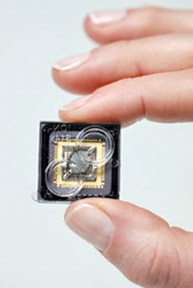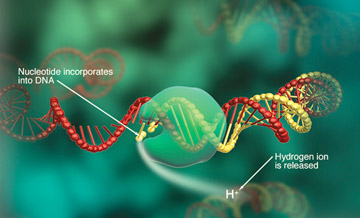|
Credence genomics:
Welcome cure for cancer
by Dhaneshi Yatawara
In the very near future a single drop of blood or a minute tissue
part of the body will be able to predict what kind of drug will suit us
best. Put it into a small handy looking machine and the result will come
in a microchip. Sounds more like a scene from a science fiction movie.
 Well, not anymore. Well, not anymore.
The global science world is approaching step by step to this level
based on our genes. Specially to treat complicated and serious illnesses
such as cancer. Wrong treatment can kill a cancer patient in addition to
the natural killing it does to the body.
"Many new drugs manufactured in the world reach Sri Lanka and there
are new technologies emerging. But with all this each year approximately
18,000 new cancer patients are diagnosed," said Dr. Mahendra Perera, a
leading oncologist in Sri Lanka.
According to him, Sri Lanka still follows the evidence-based
medication which is steadily fading from the world - meaning the
medicine is chosen according to clinical evidence showing the
effectiveness of the drug on a disease or diseases.
Characteristics
This gets complicated with the seriousness of the cancer and heavy
expenses of the drugs. One fourth of the patients treated with
evidence-based treatments die and that shows there is something wrong
with it.
Genes are the magical spell in our body cells that determine our many
characteristics. In the same process it determines our strength and
weaknesses against disease. Such a specific method can predict our
levels of reaction to medication based on our genetics which helps
doctors prescribe drugs to treat specific to each individual, rather
swallowing or injecting a drug that can treat a broader spectrum of
diseases, presuming the sickness of the patient.
Such precision treatment has become possible in today's world with
the development of the gene technology field which is called Next
Generation Sequencing. NGS.
Reality
Though NGS is advanced and expensive it still can bring solutions to
serious and complicated illnesses that doctors struggle to cure while
saving the quality of life of the patient. Genetic disorders and cancer
are the best examples.
In each moment in our lives we witness numerous medical advancements
which are expensive and too far from developing countries such as ours
where most patients heavily depend on the public health service.
It may look as it NGS is one of those. Fortunately the technology has
reached our soil. Not just theoretically among academia. But as a
commercial venture at a reasonable price.
Credence Genomics, the country's first commercial and biotechnology
venture was initiated a week ago making precision treatment a reality. A
subject new to the world the entrepreneurs take a risk in establishing
such business where precision, credibility and cost affect the growth of
the business.
In developed countries where each citizen is medically insured,
choosing such an expensive method is possible. Thus the businesses have
a market. With all the risks the Sri Lankan medical field welcomes such
a venture in our soil for many reasons.
Cancer is caused by multiple factors and patients do not react
equally to treatments. It is the complicated nature of the disease. Yet,
NGS can simplify this at any given level and precise medication can be
prescribed.
 Treatment of primary cancer will not end the illness. Cancer can
escape to any side be it liver, lungs, brain. But to treat the first
level its only chemotherapy. Treatment of primary cancer will not end the illness. Cancer can
escape to any side be it liver, lungs, brain. But to treat the first
level its only chemotherapy.
Chemotherapy
"There are so many drugs pouring in to the country and the doctors
are also using them based on evidences available. We are purchasing
millions worth of drugs but we do not see much response in cancer
survivals," Dr. Perera said.
The cost of these medicine for chemotherapy are very expensive. "Sri
Lankan Government today gives us 1.5 million rupees for one cancer
patient for a year to purchase these drugs. This is in addition to the
basic cancer drugs available in Sri Lanka, he said.
"If we take a similar cancer in 10 people they react in 10 different
ways. Some patients may survive only for six months, some for few years
and some for 10, 15 or 20 years even. Normally, the blame will be on the
doctor. It is not anyone's fault, it is the genes of the system,
according to the new findings," he said.
"Most of Sri Lankan patients go for private hospitals for
consultation but due to the high cost for treatment they are referred to
the Government hospital," doctor Perera added.
"Doctors aim at curing cancer. Proper curing has three aspects -
biological, functional and psychological," he said.
Curing biologically doctors practically destroy cancer cells somehow.
"But that does not mean the patient should not be compromised of his
functions. Removal of a leg in the course of the treatment is not
preserving his or her ability to function close to normal level at
least. That is not a functional cure for the patient. At the same time
the patient should feel that with the treatment that they are given a
very near normal life. That is the psychological aspect," he explained.
"Cancer starts in a very small spot and keeps on progressing. Cancer
is a multi factorial event. If we diagnose sore-throat we know that it
is caused by streptococcal pharyngitis and can be treated accordingly.
But in a cancer there are so many factors that play such as genetics and
carcinogenic substances.
This is what triggers the abnormal multiplication of a cell. Cancer
spreading in to other internal organs is another level of the disease,"
Perera said.
The answer is personalised cancer treatment. Personalised cancer
treatment is the treatment to a patient based on his molecular
characteristics. In this method a drug can be matched at a laboratory to
suit the molecular structure of a patient. This way the precise drug or
a drug regime can be identified. This is where NGS plays a crucial role.
It is important to diagnose the abnormal cell and treat the patient
accurately, which is more successful.
What we need to do is maximise the efficiency of the treatment. We
can avoid the severe adverse effect of cancer drugs that literally
destroy the patient, Dr. Perera said.
This will be a comprehensive cancer cure at a very lesser cost where
the patient will not suffer from the financial and psychological burden.
|

